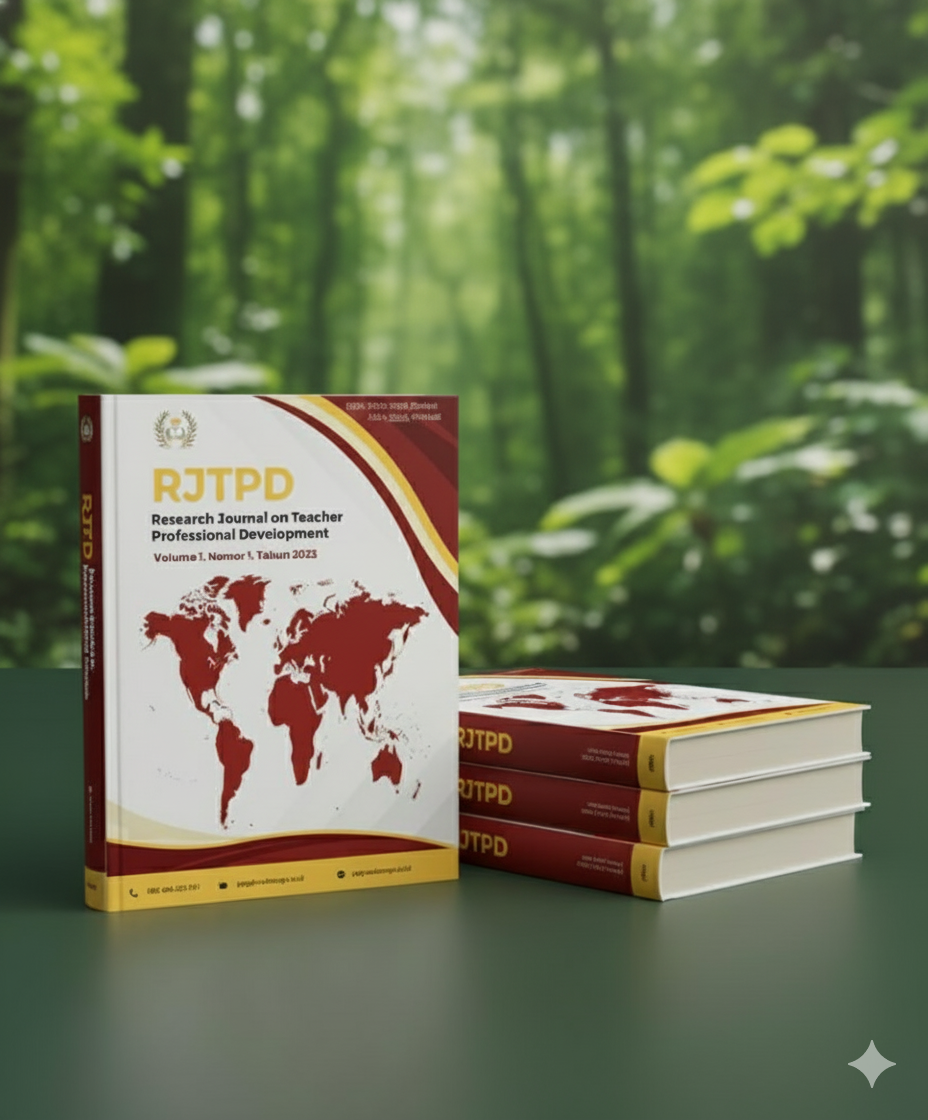Utilization of Wordwall as an Interactive Game Media to Improve Motivation and Learning Outcomes of Asmaul Husana of Elementary School Students
DOI:
https://doi.org/10.21580/rjtpd.v3i02.24632Abstract
Monotonous and less interactive learning often leads to a decrease in student motivation and learning outcomes, especially in memorized subjects such as Islamic Religious Education (PAI). This study aims to analyze efforts to improve the learning outcomes of grade V students in Asmaul Husna's material through the application of Wordwall interactive game media. The research uses a classroom action research (PTK) approach with a spiral design consisting of two cycles, involving 28 students of SDN Nongkosawit 01 as subjects. Data collection is carried out through observation, questionnaires, and documentation of learning outcomes, while data analysis is descriptive, qualitative, and quantitative. The results showed a significant increase in learning completion: in the pre-cycle only 35.71% of students completed (average class 63.17), increased to 57.14% in cycle I (average 68.00), and reached 84.21% in cycle II (average 74.64). These findings prove that the use of Wordwall interactive game media is effective in improving students' understanding and learning outcomes in Asmaul Husna's material. The implications of this research provide practical contributions for teachers in designing innovative, interactive, and fun learning, while enriching the treasures of technology-based learning media development in elementary schools.
Downloads
References
Aditya, B., Iradianty, A., & Kotama, I. (2023). Qualitative analysis of gamification elements in ICT-based games for early childhood. Journal of Information Technology and Computer Science, 10(4), 725. https://doi.org/10.25126/jtiik.20241046285
Aisa, A., Ali, M., & Burhanuddin, B. (2021). Teachers' strategies in improving student learning outcomes in Islamic religious education subjects. JEC, 5(2), 72-82. https://doi.org/10.35326/jec.v5i2.3209
Alfaizi, F., Airohmah, Y., & Anbiya, B. (2023). Analysis of concepts, information technology theories and their implications in the development of pai learning technology in Indonesia: systematic literature review. Journal of Social Technology, 3(11), 931-943. https://doi.org/10.59188/jurnalsostech.v3i11.985
Faradiba, Y., Jahja, Y., & Khasanah, A. (2022). School management strategies in kindergartens through social reality. Indonesian Journal of Education, 3(10), 870-878. https://doi.org/10.36418/japendi.v3i3.654
Farhiyah, D. and Ula, M. (2021). Design and build an android-based asmaul husna learning media application. Sisfo Scientific Journal of Information Systems, 5(2).
Fitria, H., Kristiawan, M., & Rahmat, N. (2019). Efforts to improve teacher competence through classroom action research training. Unwahas, 4(1). https://doi.org/10.31942/abd.v4i1.2690
Henrliniar, D. (2023). Efforts to improve the analytical ability of students of SMA Negeri 1 Lebakwangi, Kuningan Regency in biology subjects through a problem-based learning model. Journal of Research and Service, 2(3), 200-217. https://doi.org/10.58344/locus.v2i3.923
Maconi, W., Pandie, R., & Boiliu, E. (2022). The relevance of the educational technology perspective to Christian religious education. Educational Journal of Educational Sciences, 4(3), 4616-4626.
Ningrum, Y., Apriyani, D., & Zikriah, Z. (2020). The design of learning media to get to know asmaul husna based on android. Journal of Research and Application of Informatics Students (Jrami), 1(04). https://doi.org/10.30998/jrami.v1i04.466
Nurhayati, R., Muslimah, A., Kadir, M., Ningsih, D., Suwito, A., & Amin, A. (2022). Coaching the acq (I love the Qur'an) method in memorizing and understanding asmaul husna. Journal of Community Service, 1(2), 8-13. https://doi.org/10.47435/pendimas.v1i2.1419
Prahmana, S. (2023). Exploring the effectiveness of using gamification techniques as an innovative learning strategy in increasing student engagement and learning motivation at Riau Tax Vocational School. https://doi.org/10.31219/osf.io/w2pgb
Rahmania, S., Soraya, I., & Hamdani, A. (2023). The use of gamification quizizz on student learning motivation in Islamic religious education subjects. Journal of Islamic Education Management, 11(2), 114-133. https://doi.org/10.30603/tjmpi.v11i2.3714
Rambe, A., Nurhakim, M., & Amien, S. (2024). Muhammadiyah education reform: an innovative approach in facing the challenges of the digital era. Muqoddimah Scientific Journal Journal of Socio-Political and Hummaniora Sciences, 8(2), 806.
Rofiq, M., Mahmud, M., & Musfiroh, I. (2019). Improving fiqh learning outcomes through a cooperative model of team games tournament (tgt) type class v mi at tarbiyah loa janan. Tarbiyah Wa Ta Lim Journal of Education and Learning Research, 6(1), 109-129. https://doi.org/10.21093/twt.v6i2.2063
Rosyida, N., Isnaini, N., Wulandari, R., Kariadinata, R., & Malík, A. (2024). Learning models and gender on student learning outcomes in Islamic religious education subjects. Journal of Tarbiyah and Borneo Teacher Training, 5(2), 229-238. https://doi.org/10.21093/jtikborneo.v5i3.6985
Selviani, D., Pratiwi, A., Aeni, F., & Aeni, A. (2023). The use of the marbah application (let's learn asmaul-husna) as a learning medium for pie in elementary schools. Journal on Education, 5(4), 14870-14880. https://doi.org/10.31004/joe.v5i4.2560
Soraya, S. (2022). The effectiveness of quantum learning in improving student learning outcomes. Tahdzib Al-Akhlaq Journal of Islamic Education, 5(1), 76-95. https://doi.org/10.34005/tahdzib.v5i1.1967
Syafi'i, A., Saied, M., & Hakim, A. (2023). The effectiveness of education management in shaping one's character. Journal of Economics and Business Ubs, 12(3), 1905-1912. https://doi.org/10.52644/joeb.v12i3.237
Tresnawati, D., Septiana, Y., & Khofidin, A. (2019). An application of Islamic rukun education for children with a multimedia development life cycle approach. Journal of Algorithms, 16(2), 166-172. https://doi.org/10.33364/algoritma/v.16-2.166
Wahiddah, S., Lathipah, L., Indaryanti, D., Fadilah, Z., & Aeni, A. (2022). Courtesy story: interactive e-book as an effort to develop ulul azmi material in elementary school. Journal of Basic Medicine, 6(3), 4182-4191. https://doi.org/10.31004/basicedu.v6i3.2778
Wahyudi, M., Kristanto, M., & Andini, R. (2024). Transformation of vocational education through game-based learning: a literature study. IJOLII, 2(01), 18-26. https://doi.org/10.20961/ijolii.v2i01.1610
Widayati, A. (2014). Classroom action research. Indonesian Journal of Accounting Education, 6(1). https://doi.org/10.21831/jpai.v6i1.1793
Downloads
Published
Issue
Section
License
Copyright (c) 2025 Suwanto Suwanto

This work is licensed under a Creative Commons Attribution-NonCommercial-ShareAlike 4.0 International License.
The copyright of the received article shall be assigned to the journal as the publisher of the journal. The intended copyright includes the right to publish the article in various forms (including reprints). The journal maintains the publishing rights to the published articles. Authors are allowed to use their articles for any legal purposes deemed necessary without written permission from the journal with an acknowledgment of initial publication to this journal.
















